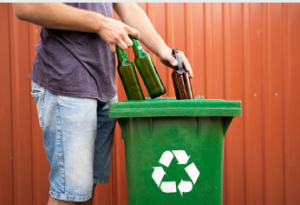Plastic bottles can be recycled; most are made from one of two types: #1 or #2 plastic (PET or HDPE). The resin ID code on the bottle indicates which kind of plastic it is. Plastics of #3 or higher are made from plants instead of natural gas and may not be collected by curbside recycling programs. In recycling bottles, most recycling programs ask that you rinse them thoroughly before they are placed in the recycling bin. That’s because the sugar remnants in the bottles can attract insects and generate odours.
 HDPE
HDPE
You can easily recycle HDPE bottles. These bottles come in various capacities, ranging from small to large. They are also highly recyclable and are widely used. In addition, they are easy to recycle and can be colour coded for marketing purposes. Blue, green, or red HDPE bottles are most common and are 79% recyclable. HDPE bottles can also be made into reusable shopping bags, bottle caps, and flexible packaging.
When you recycle HDPE bottles, you save the environment by not adding another plastic to the landfill. The HDPE recycling process uses the resin identification code created decades ago. Today, it is less common to be asked for by its resin code number since HDPE has become highly adept at evading landfills. As a result, HDPE bottles are accepted by almost all curbside recycling programs. Learn more about the importance of a bottle recycling storehouse here.
The APR design guide for recycling HDPE packages can help you choose the right solution for your packaging. It can help you meet your sustainability goals while achieving the highest possible yield. If you have questions about your packaging materials, you can always ask APR. It can help you choose the best solution for your brand. In addition, it offers tools for achieving the highest yield possible. That way, you can ensure you’re doing your part to improve our environment.
PET
Almost every community accepts PET bottles and jars for recycling. PET is used to make clamshell containers that you find in grocery stores. This plastic, known as thermoforms, makes up only a tiny percentage of the total PET product. Therefore, recycling them can reduce the amount of trash sent to landfills. PET reclaimers also make fabrics from the material. Unfortunately, they are often more expensive than virgin materials. Here are some benefits of recycling PET bottles and jars. Learn more about the importance of a bottle recycling storehouse here.
While many cities and countries have recycling laws, not all do. Many countries have recycling companies that pick up your plastic bottles and bring them to a recycling facility. Recycling PET bottles involves sorting the bottles to separate glass from metal. Using this method will reduce greenhouse gas emissions and save energy. However, if you live in a country that does not collect PET bottles, you must search for recycling options.
The label on 100% rPET bottles will feature “Recycle Me Again” messaging. These messages will be found in four different areas of the packaging. This campaign will include radio, outdoor, in-store, social/digital communications, and touch-free experiential activations. By 2020, Coca-Cola, Pepsi, and Pepsi will use 100 per cent recycled plastic bottles in their bottles, although they have not set a date for reaching this goal.
Polypropylene
Plastic bottles are made from oil and gas molecules that are chemically bonded together. These molecules are known as monomers. These compounds are then melted down at a manufacturing facility and formed into long polymer chains. These chains are then shaped into moulds, where machines fill the bottles. The bottles then undergo a series of steps to ensure quality, including sterilisation. If you recycle Polypropylene bottles properly, you can help protect the environment.
There are many benefits to recycling Polypropylene. You’ll help the environment and support local companies by reducing landfill waste. Recycling your old PP bottles can help you do your part in reducing the amount of new plastic produced each year. Additionally, recycling polypropylene bottles will help the environment by reducing greenhouse gasses and ground pollution. The plastic bottles you recycle will last longer and make fewer LPCE bottles.